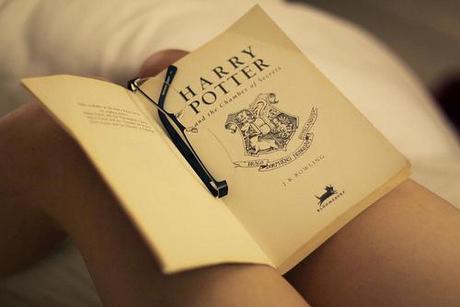
We Heart It
You didn’t think I was finished talking about Harry Potter yet, did you? You should seriously know better than that. As it happens, I have two more things that cropped up in my brain I’d like to tell you about – two gifts of reading Harry Potter, really. You see the thing about reading Harry Potter, although some readers, especially younger ones who haven’t read as diversely yet, probably can’t see this in the books, is that Harry Potter is written in almost a classic novel style. While the language is modernized, Rowling’s style of writing definitely tells on her. I spy with my little eye all the experience she has in diverse reading. It shows in her work. Can you see it? You don’t have to look all that closely.
The Want to Read More Classically
My point is, because I can tell through her writing how broadly she’s read it makes me yearn for reading more classically myself. In fact, when I think of my bookshelf full of books I’ve bought over the years, I begin to wish that I would’ve spent my money on more classic novels. What Harry brings to the table is a care for plot and character development. Also, I find it apropos that in Rowling’s magical world, there is no electricity allowed. You hear that technology? It’s an immensely refreshing idea that these two realms of the world should not mesh. The fact that electricity is disabled within the spectrum of magic shows kids that outlandish, adventurous, entertaining, and dangerous things can happen without cell phones and iPod’s. Not that those things aren’t cool, but they’re not everything. Harry Potter hearkens us back to an earlier age where using quills and fire lamps is the way to go, instead of flashlights and ink pens. While the wizarding world does have magic on their side in terms of living, Rowling’s world gives us a new way of looking at lifestyle as something more than material. This makes me want to gobble up Dickens and Austen and Bronte (all three of them) and Proust and anyone else who lived way back in the day to tell stories of people who survived sans overly advanced technology.
The Want to Read More Children’s Books
While Harry Potter does venture into young adult literature, I always keep with the genre of children’s lit when reading through the books. Maybe this is because the character’s start out so young or because there are strong messages to be had for children who read the books, even if they’re reading The Deathly Hallows at age 11 (and if you are, I applaud you). There’s something about children’s books that are so innocent and raw. Most young adult novels these days can be exhausting because the characters move into a stage of life where melodrama rules. I’m not saying this is the case for ALL young adult novels (to see ones that aren’t, read Jennifer Donnelly’s A Northern Light or L.M. Elliott’s Under a War Torn Sky). I feel like a lot of books feature characters that are merely stereotypical but don’t harbor any authentic human qualities (the Gossip Girl and Clique series’ for example). Although Harry does show some melodramatic tendencies in a few of the books, it’s believable because of the circumstances of the plot. Maybe it’s just me. Maybe I get tired of recognizing the true reality of melodrama in everyday life, and would rather read books about Jane Eyre’s and Scout’s and Mattie Gokey’s and Tom’s and Huck’s. I miss characters like that. I miss stories like that. And J.K. Rowling does an amazing job of bringing back those essences of unique, powerful, moving, insightful, thought-provoking, and a whole heck of a lot of other positive words in her characters.
In reading the Harry Potter books I’m reminded of why I’m so attracted to ideas that involve children beating their way through childhood. They’re not yet tainted by the melodrama I feel clogs YA bookshelves these days. While Harry Potter is a world of fantasy, it honestly doesn’t feel like it. Rowling makes the wizarding world seem like its only three blocks down from your neighborhood English pub (not that I live in the UK or anything). Her books are threaded with so much authenticity through her settings and characters and storylines, you start to believe in it more than you do your own life. Okay, well, maybe that’s exaggerating, but you get my meaning.
Harry Potter does more for us than teach a horde of lessons; it makes us demand better quality of writing and development from the author’s whose books we read. It also demands more from us as writers, and expects more of us as readers.
What do you think? Is it all in my head or is there a lot of melodrama on today’s bookshelves? Do you hate it or love it?
